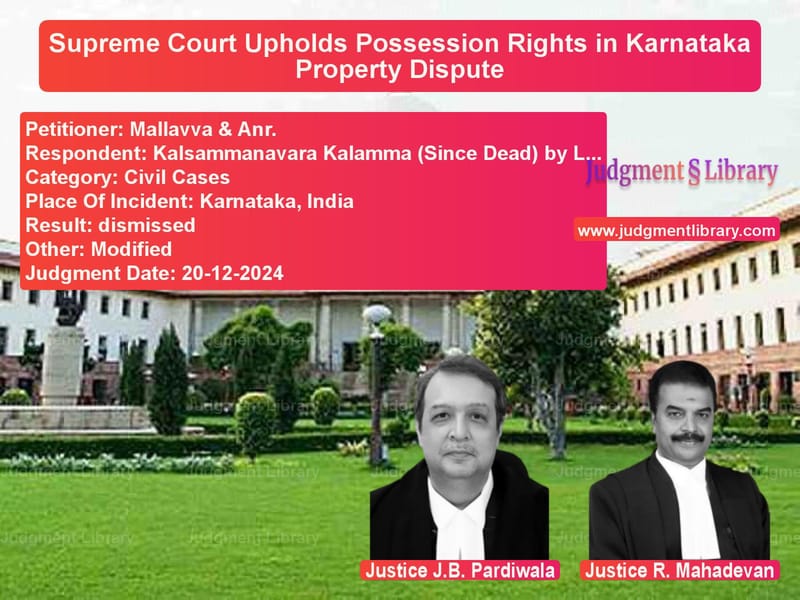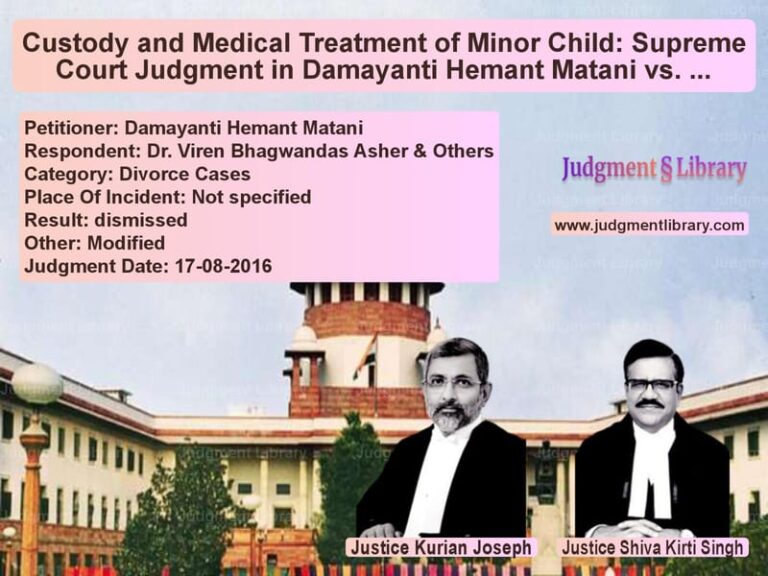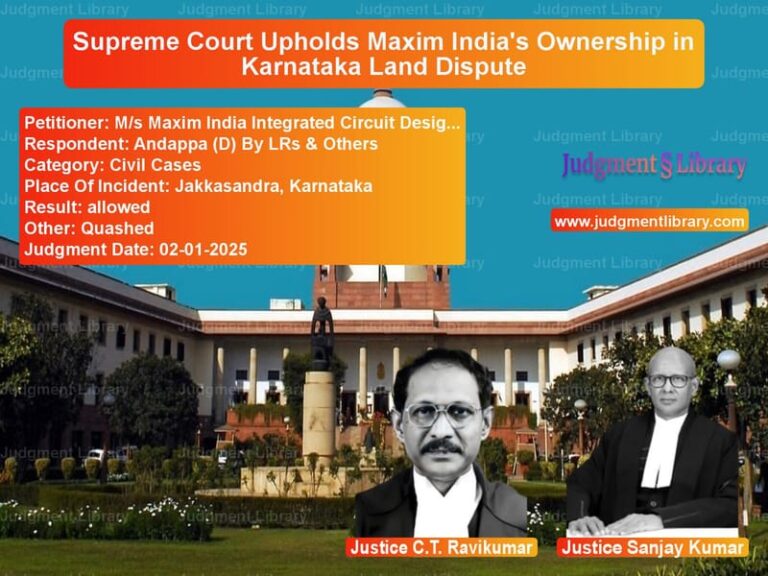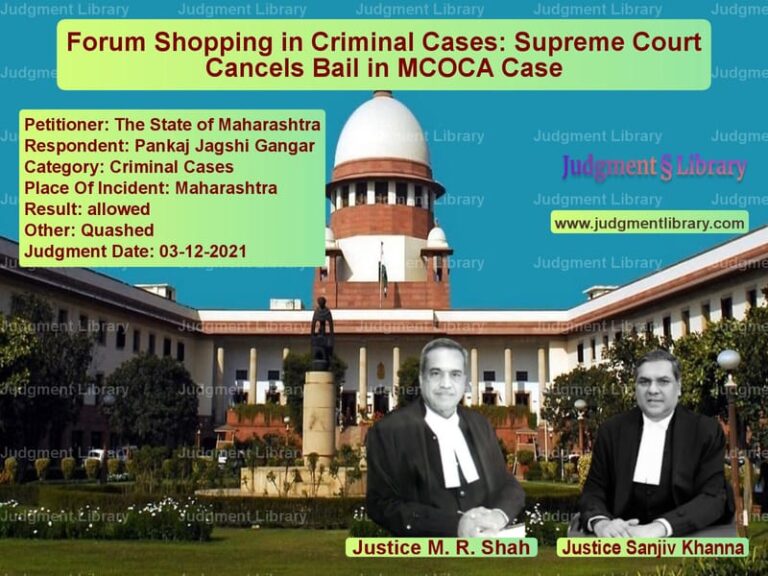Supreme Court Upholds Possession Rights in Karnataka Property Dispute
The Supreme Court of India, in the case of Mallavva & Anr. vs. Kalsammanavara Kalamma (Since Dead) by Legal Heirs & Ors., delivered a crucial verdict on property possession and ownership rights. The judgment, delivered by J.B. Pardiwala and R. Mahadevan, upheld the First Appellate Court’s ruling and dismissed the appeal, affirming the plaintiff’s ownership and granting possession of the disputed land.
Background of the Case
The dispute involved agricultural land in Karnataka, which was claimed by both parties based on inheritance and possession records. The original plaintiff, Kalsammanavara Kalamma, filed a suit for declaration and injunction regarding the suit property, asserting ownership based on ancestral inheritance.
The defendants (appellants) countered the claim, stating that they had lawfully possessed the land for decades and that the plaintiff’s claim was barred by limitation. The Trial Court ruled in favor of the defendants, leading the plaintiff’s legal heirs to challenge the verdict before the First Appellate Court.
Legal Issues Considered
- Whether the plaintiff had valid ownership rights over the disputed land?
- Was the plaintiff’s claim barred by limitation under Article 58 of the Limitation Act?
- Did the defendants establish adverse possession over the suit property?
- Was the amendment of the plaint to include a possession claim valid at the appellate stage?
Arguments by the Appellants (Defendants)
The appellants, represented by Senior Advocate Ramesh Kumar, argued:
- The suit property had been in their possession since 1981-82, as reflected in revenue records.
- The plaintiff’s claim, filed in 2011, was barred under Article 58 of the Limitation Act, which prescribes a three-year limitation period for declaratory suits.
- The plaintiff’s amendment of the plaint at the appellate stage to include a possession claim was legally impermissible.
- The defendants’ possession had become adverse to the plaintiff, granting them ownership through adverse possession.
Arguments by the Respondents (Plaintiffs)
The respondents, represented by Senior Advocate Prakash Desai, countered:
- The plaintiff’s ownership claim was based on documented inheritance and ancestral rights.
- The suit was filed when the defendants denied the plaintiff’s title in 2010, making it timely under the Limitation Act.
- The amendment of the plaint at the appellate stage was valid since possession was an inherent issue in the title dispute.
- The defendants failed to establish adverse possession as they did not plead or prove continuous hostile possession.
Supreme Court’s Observations
On Ownership Rights
The Court observed:
“The First Appellate Court rightly held that the plaintiff is the absolute owner of the suit properties. The defendants failed to provide valid ownership documents.”
On Limitation and Adverse Possession
The Court ruled:
“The suit is governed by Article 65 of the Limitation Act, which provides a 12-year limitation period for possession claims. The defendants did not prove adverse possession, and mere long-standing possession does not confer ownership.”
On Amendment of the Plaint
The Court cited previous rulings, stating:
“An amendment seeking possession is permissible at the appellate stage if it arises from the original cause of action. The First Appellate Court was correct in allowing the amendment.”
Final Verdict
The Supreme Court dismissed the appeal and upheld the First Appellate Court’s ruling. Key directives:
- The plaintiff’s legal heirs were declared absolute owners of the suit property.
- The defendants were directed to hand over possession within 60 days.
- The judgment of the Karnataka High Court was affirmed, dismissing the Second Appeal.
Impact of the Judgment
This ruling has significant implications:
- Strengthens inheritance rights: Validates legal heirs’ claims over ancestral properties.
- Limits misuse of adverse possession: Mere occupation does not confer ownership.
- Allows procedural flexibility: Courts can allow possession claims at the appellate stage.
The judgment reinforces legal clarity on property ownership and possession disputes, ensuring fairness in inheritance claims.
Petitioner Name: Mallavva & Anr..Respondent Name: Kalsammanavara Kalamma (Since Dead) by Legal Heirs & Ors..Judgment By: Justice J.B. Pardiwala, Justice R. Mahadevan.Place Of Incident: Karnataka, India.Judgment Date: 20-12-2024.
Don’t miss out on the full details! Download the complete judgment in PDF format below and gain valuable insights instantly!
Download Judgment: mallavva-&-anr.-vs-kalsammanavara-kalam-supreme-court-of-india-judgment-dated-20-12-2024.pdf
Directly Download Judgment: Directly download this Judgment
See all petitions in Property Disputes
See all petitions in Succession and Wills
See all petitions in Landlord-Tenant Disputes
See all petitions in Specific Performance
See all petitions in Judgment by J.B. Pardiwala
See all petitions in Judgment by R. Mahadevan
See all petitions in dismissed
See all petitions in Modified
See all petitions in supreme court of India judgments December 2024
See all petitions in 2024 judgments
See all posts in Civil Cases Category
See all allowed petitions in Civil Cases Category
See all Dismissed petitions in Civil Cases Category
See all partially allowed petitions in Civil Cases Category







